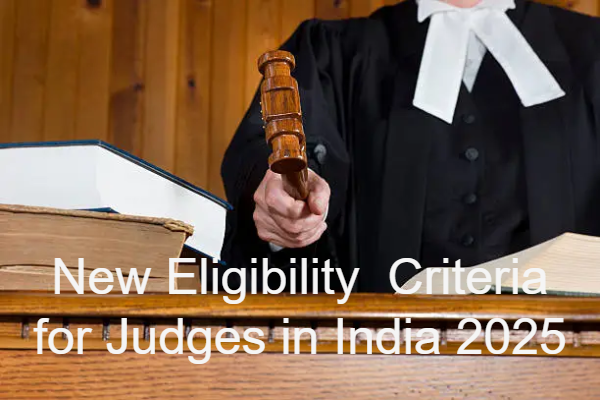New Eligibility Criteria for Judges in India 2025
A subtle but significant revolution is taking place in India’s legal environment, and at the core of this movement are judicial reforms that are aimed at establishing a stronger and more competent judiciary. In 2025, two significant events have prompted heated debate in legal circles and beyond: a reinterpretation of qualifying standards for judges, and a rising clamor for the formation of a National Judicial Service (NJS). Both of these developments have become more important.
Emerging Eligibility Standards for Aspiring Judges to Consider
For applicants to be qualified for appointment as civil judges, the Supreme Court of India has declared that they must have a minimum of three years of legal practice at the Bar. This decision is a watershed in the history of the Indian judiciary.
In what way does this imply?
The majority of states allowed law graduates to submit their applications for judicial service tests directly after graduation up to this point. Now, with this decision:
- First-year law students are required to obtain experience in the courts before applying.
- Its purpose is to close the gap that exists between theoretical knowledge and actual skills or abilities.
- In order to be eligible for entry-level judicial posts, candidates must have previously worked in the legal profession for a minimum of three years.
💬 What caused this change?
The reasoning for this is straightforward: before presiding over cases, judges need to have a solid understanding of the field realities of legal practice. The courtroom is not a classroom, and the administration of justice requires not just academic expertise but also practical understanding.
Why is there such a strong advocate for a National Judicial Service?
There is a renewed push for the establishment of the National Judicial Service (NJS), which is a centralised recruiting organization for lower judicial appointments across states. This drive comes alongside the changes that are being implemented to improve eligibility.
So what is the NJS?
Following in the footsteps of the IAS and IPS, the **NJS would conduct:
- A uniform examination at the national level should be administered to civil judges and magistrates.
- Implement uniformity in the recruiting processes across all states.
- Ensure that each appointment is transparent and based on merit.
Why at this moment?
With thousands of vacant positions and more than 40 lakh cases that are still waiting, India’s lower court is having a difficult time. Delays and irregularities in recruiting at the state level have made the situation much more difficult.
- For example, a unified service such as the NJS could:
- Speed up the recruitment process.
- Establish and maintain consistent criteria of judicial competence.
- Put an end to favoritism and anomalies in the selection process for governmental positions.
This is the larger picture.
Both of these measures, required courtroom experience and a centralised NJS, are components of a larger effort to professionalize the judicial system, improve accountability, and regain the trust of the general public.
But they are not without opposition. Some legal scholars argue that:
Mandatory practice years may discourage talented students from judicial careers.
States may resist NJS as an encroachment on their autonomy.
Nevertheless, the motivation for change is increasing, and the year 2025 represents a turning point for those who are interested in becoming judges in India. One must today possess not only academic brilliance but also practical legal experience and a national perspective in order to be considered for a position on the court.
I would like to inform you that if you are a law student or a young lawyer who is aspiring to work in the court, the time has come to make appropriate preparations. If you want to be prepared for a new age of legal service tests, you should keep track of changes in state notifications.
Bibhu Mishra is a prolific writer who has published many books spanning various genres. He is a legal enthusiast and an avid researcher of cutting-edge technology, diving into fascinating realms to bring captivating narratives to life.


